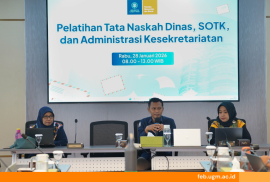Getting articles published in reputable journals is often challenging for academics and researchers. To help them succeed, the Faculty of Economics and Business of Universitas Gadjah Mada (FEB UGM) organized a workshop titled “Sustainability Research: How to Publish in a Top Journal on Tuesday, November 12, 2024.
The event, organized by FEB UGM’s Department of Accounting and Accounting Laboratory as part of the Methods in Sustainability Research series, featured sustainability research expert Professor Kazi Sohag, Ph.D., from the Graduate School of Economics Management, Ural Federal University, Russia. Kazi shared tips on topic selection and strategies for writing compelling abstracts that researchers can follow.
Kazi began his presentation by emphasizing the importance of choosing indexed journals with high rankings, such as those listed in Scopus or Web of Science. He explained that to increase the chances of being accepted by high-quality journals, researchers need to understand the journal’s quartile classification, as the top-ranked journals (Q1) tend to have more impact and are referenced more often.
Kazi emphasized the importance of choosing interesting and relevant topics, as topics with global significance have a better chance of being accepted by prestigious journals. He also reminded participants to focus on a single primary question in each scientific paper. “It’s important to focus on one question so that the analysis can go deeper and not get bogged down in complexities that are hard to follow. Scientific papers that cover multiple topics tend to lose direction and become difficult to complete,” he explained on Tuesday (11/12).
Writing journal articles, especially in finance, requires precise structure and simple language so readers can easily follow along. Kazi noted that a compelling writing style can be found in the Journal of Financial Economics, where article titles are short but immediately convey the essence of the research. A concise, straightforward writing style of journals is essential so readers can quickly understand the core issue. “Titles should be short and compact, include questions that invite debate, and relate to important current issues,” he added.
Another important aspect is that the abstract should include the research objective, the methods used, the main findings, and the implications for relevant policies or sectors. When writing the introduction, it’s best to directly state the research’s purpose and main motivation, followed by a brief reference to previous studies. Select only the most relevant references for the literature review to demonstrate a deep understanding of the field and increase credibility with editors and reviewers. The conclusion section should summarize the research objective, key findings, and implications for theory, practice, policy, or societal impact without including references. “These steps will make the scientific paper more engaging, relevant, and valuable to the field,” he explained.
In addition, Kazi emphasized the importance of finding the right journal to ensure that the research topic matches the journal’s scope. Some reputable journals from major publishers such as Elsevier, Blackwell, Springer, and Taylor & Francis offer platforms that allow researchers to search for journals by topic or keyword, making it easier to find relevant journals. “Citing numerous articles and referring to current issues shows that you are keeping up with developments in the field. This can increase your credibility in the eyes of editors and reviewers. Also, don’t wait too long to submit your paper, as this can lead to a loss of motivation,” he explained.
Kazi emphasized that rejection is common in academic publishing. Therefore, he encouraged researchers and academics to stay motivated and improve their work. “The bad news is that some top journals have rejection rates of 80-90%. The good news is that most rejected papers eventually get published, although it may take time,” he concluded.
Reportage: Shofi Hawa Anjani
Editor: Kurnia Ekaptiningrum
Sustainable Development Goals








